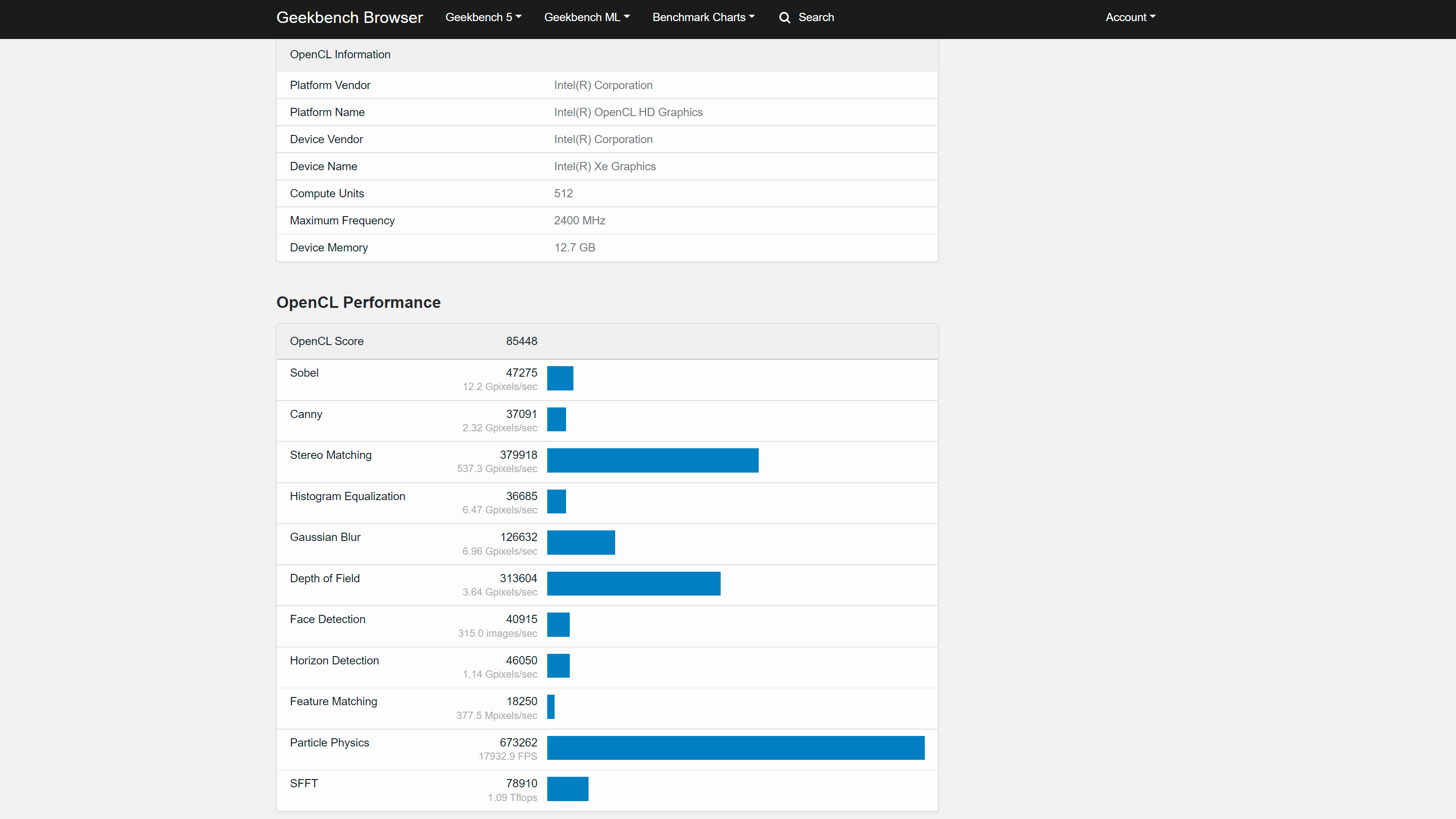RTX 3070 Beats Intel Flagship Arc Alchemist GPU In OpenCL
The flagship Intel Arc Alchemist graphics card hits 2.4 GHz in a new OpenCL benchmark. Nonetheless, the DG2 graphics card was still no match for Nvidia's GeForce RTX 3070 (Ampere), one of the best graphics cards on the market.
Barring any setbacks, Intel's DG2 family of discrete desktop graphics cards will arrive in the second quarter of the year. The flagship Arc Alchemist SKU will wield up to 512 execution units (EUs) and up to 16GB of GDDR6 memory. The graphics card has scaled up to 2.4 GHz in the new Geekbench 5 submission (via Benchleaks), likely the graphics card's boost clock. But, of course, it's an engineering sample, so the clock speed isn't final.
If we look at the performance on paper, the flagship Arc Alchemist should deliver around 20 TFLOPs of FP32 performance. Of course, it's not the best metric for gaming, but it's the only information available. Based on the FP32 performance, the DG2-512 theoretically performs similar to the often referenced GeForce RTX 3070. The AMD equivalent would be Radeon RX 6700 XT (Big Navi).
The Arc Alchemist scored 85,448 points in the OpenCL test, which isn't the best indicator of gaming performance, of course. Nevertheless, the level of performance would put the flagship Arc Alchemist in the same alley as the GeForce RTX 2070 as far as OpenCL workloads go. If we compared it to Nvidia's latest offerings, Intel's graphics card is around 40% slower than the GeForce RTX 3070. Being engineering samples and unreleased hardware, we should take the performance figures with a truckload of salt.
In another benchmark, a similar DG2-512 sample, which maxed out at 2.1 GHz, had surpassed Nvidia's GeForce RTX 3070 Ti in some workloads. It would seem that Intel has been making progress in optimizing the Arc Alchemist's clock speeds. The early rumors pointed to a 2.4 GHz to 2.5 GHz maximum boost clock for the flagship DG2 part.
The only benchmark that's remotely close to a gaming workload came in the shape of an Ashes of the Singularity submission back in December. However, a mysterious Arc Alchemist sample had put up numbers that were very close to a GeForce RTX 3070, which lends some credence to the rumor that the DG2-512 SKU could potentially offer gaming performance that's close to Nvidia's mid-range performers.
Get Tom's Hardware's best news and in-depth reviews, straight to your inbox.

Zhiye Liu is a news editor, memory reviewer, and SSD tester at Tom’s Hardware. Although he loves everything that’s hardware, he has a soft spot for CPUs, GPUs, and RAM.
-
Krotow It is now only synthetic benchmarks and speculations. We should wait when real Arc cards will appear together with test results from real games. Only then it will be possible to conclude something.Reply -
hotaru251 i mean does anyone actually expect it to be better?Reply
at or near performance sure, but not better. -
LolaGT That is a misleading meaningless headline.Reply
If the card has stable drivers(Probably the biggest question) and performs in the ballpark somewhere around a 3060ti, it won't matter, retailers won't be able to keep them on the shelves.
Until there are actual cards running real world gaming benchmarks there is little point. -
VforV ReplyThe AMD equivalent would be Radeon RX 6700 XT (Big Navi).
Amateur writer and click bait title, again. This guy writes about GPUs and does not even know the meaning of the words he uses... RX 6700 XT is not Big Navi.
Tom's is not only full of snowflakes that get you banned for calling them muppets for being that, but also the quality of writers and articles is going down the toilet. Pathetic. -
saltweaver What kind of benchmark is OpenCL ? I know OpenCl was available in Blender but was recently replaced by AMD HIP.Reply
-
renz496 Replysaltweaver said:What kind of benchmark is OpenCL ? I know OpenCl was available in Blender but was recently replaced by AMD HIP.
it was supposed to be the first open source API standard for compute (be it CPU or GPU). an alternative to hardware specific API such as CUDA (Nvidia) or STREAM (AMD) or other proprietary compute API such as Direct Compute (Microsoft). -
saltweaver Reply
I think game benchmark or Cinebench would provide more deeper results how Alchemist is far from 3070. Nvidia had project showing cinematic ray-traced scenes running in real time on Unreal Engine 4. Intel should use this for better comparison.renz496 said:it was supposed to be the first open source API standard for compute (be it CPU or GPU). an alternative to hardware specific API such as CUDA (Nvidia) or STREAM (AMD) or other proprietary compute API such as Direct Compute (Microsoft).
pNmhJx8yPLkView: https://www.youtube.com/watch?v=pNmhJx8yPLk
